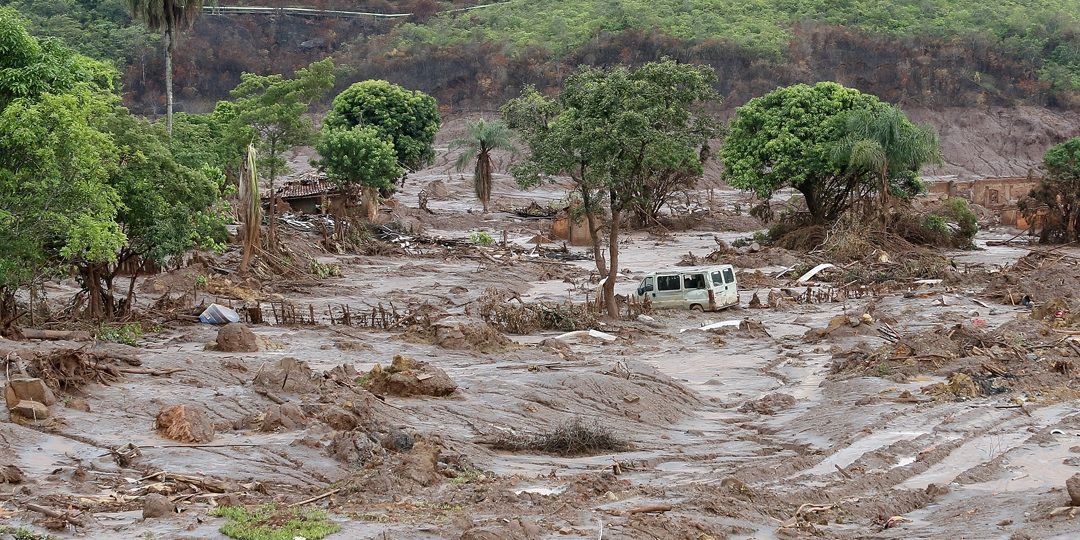5 November 2020 marks 5 years since the Fundão tailings dam burst in the municipality of Mariana in Minas Gerais, Brazil, releasing 39.2 million cubic meters of toxic waste into the Rio Doce river basin. As a result of the companyneglect of the dam’s security, 19 people were killed and the water and soil were contaminated in an area the size of Portugal making fishing and farming impossible. 1.4 million people living alongside the now toxic river have lost their homes, been forced to leave out of health concerns of loss of livelihoods, or remain at risk of being displaced.
It is commonly referred to as the worst environmental disaster in Brazilian history.
The dam belonged to Samarco Mineração S.A.: a limited liability company and joint venture owned equally by Anglo Australian company BHP Billiton Brasil Ltda. and Brazilian Vale S.A. In a moment of painful irony three years later in January 2019, another mining dam owned by Vale collapsed and killed 270 people in Brumadinho, Brazil – just 75 miles from the Fundao dam. Numerous other communities, such as Piquia de Baixo, remain highly polluted by regular mining and steel operations.
While 21 people from the mining companies were charged with qualified homocide in 2016 by the Brazilian Federal Public Ministry, they still have not been held accountable. A civil action asks for $27.4 billion to repair all the damages. The Renova Foundation set up by the mines reports to have paid approximately R $ 2.6 billion ($450 million) in indemnities and emergency financial aid to 321,000 people. Brazilian Federal prosecutors now accuse BHP and Vale of colluding with a lawyer to reduce compensation to the 31,000 affected residents in Baixo Guandu down the river to just 10,000 reais ($1,780) in moral damages, a little more than a minimum wage in Brazil. BHP, Vale and Samarco would no longer be liable to victims that accepted this compensation.
A catastrophic case of corporate negligence risks to be forgotten and ignored. Brazil remains a literal minefield of weak dams, poor compensation and corporate impunity. The international legislation to assure just operations of multinational corporations is clearly falling short. The United Nations Human Rights Council is currently negotiating a binding treaty to hold multinational corporations accountable for human rights and environmental violations throughout their global supply chains. This would support rights-holders in affected communities to hold justice processes in the headquarter countries of multinational corporations, giving them access to more justice systems. CIDSE, our members and partners continue to follow the legislative progress and make recommendations for the draft text of this treaty. After a recent negotiation week of poor participation from the EU and disruptive inputs from China, Russia and Brazil, Mariana’s anniversary rings a solemn bell of ongoing loss, with little sign of change.
The Brazilian civil society movement Movimiento dos Atingidos por Baragens (‘movement of those affected by dams’ or ‘MAB’ by it’s Portuguese acronym) is calling for the participation of other organisations in a series of emblematic activities to continue resisting around the anniversary of the crime:
- Watch the virtual exchanges (in Portuguese)
- Put pressure on the Brazilian judiciary by sending the template letter here to the email address of the responsible court.
- Share the social media materials prepared
- Make photos or videos with messages of solidarity with the motto of this year’s Journey: “Vale with injustice in its hand, 5 years without reparation in the Doce River basin” and with the left fist raised, identifying your name, city, and organization.
- Follow and share the online news of the demonstrations that will be held in different parts of Brazil on November 5.
Resources:

